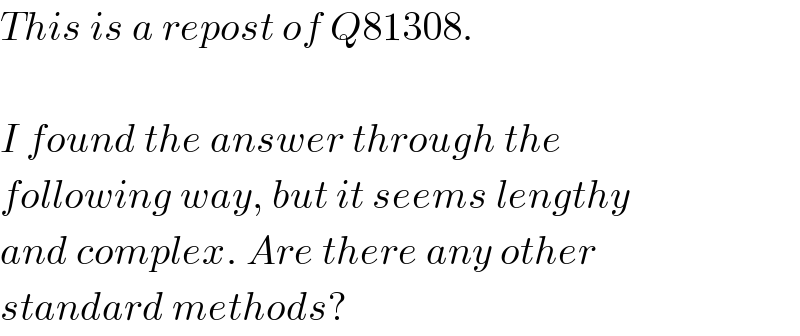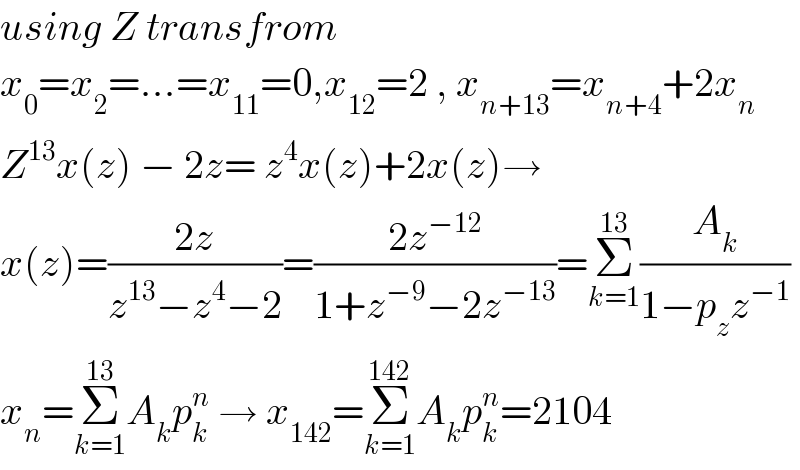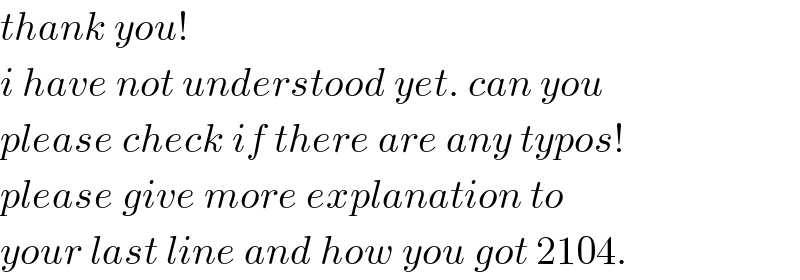Question Number 81369 by mr W last updated on 12/Feb/20

Commented by mr W last updated on 12/Feb/20

$${This}\:{is}\:{a}\:{repost}\:{of}\:{Q}\mathrm{81308}. \\ $$$$ \\ $$$${I}\:{found}\:{the}\:{answer}\:{through}\:{the} \\ $$$${following}\:{way},\:{but}\:{it}\:{seems}\:{lengthy} \\ $$$${and}\:{complex}.\:{Are}\:{there}\:{any}\:{other} \\ $$$${standard}\:{methods}? \\ $$
Commented by mr W last updated on 12/Feb/20

Commented by MJS last updated on 12/Feb/20

$$\mathrm{I}\:\mathrm{think}\:\mathrm{there}\:\mathrm{is}\:\mathrm{no}\:\mathrm{better}\:\mathrm{method},\:\mathrm{but}\:\mathrm{you} \\ $$$$\mathrm{made}\:\mathrm{a}\:\mathrm{consequent}\:\mathrm{typo}\:\mathrm{134}\:\mathrm{instead}\:\mathrm{of}\:\mathrm{143} \\ $$
Commented by MJS last updated on 12/Feb/20

$$\mathrm{can}\:\mathrm{you}\:\mathrm{find}\:\mathrm{the}\:\mathrm{last}\:{n}\:\mathrm{with}\:{x}_{{n}} =\mathrm{0}? \\ $$
Commented by mr W last updated on 12/Feb/20

$${thank}\:{you}\:{for}\:{reviewing},\:{and}\:{pointing} \\ $$$${out}\:{the}\:{typo}!\:{let}\:{me}\:{thinking}\:{about}\:{the} \\ $$$${question}\:{about}\:{x}_{{n}} =\mathrm{0}. \\ $$
Commented by MJS last updated on 12/Feb/20

$$\mathrm{I}\:\mathrm{think}\:\mathrm{it}'\mathrm{s}\:\mathrm{at}\:{n}=\mathrm{108} \\ $$
Commented by mr W last updated on 12/Feb/20

$${yes}!\:{x}_{\mathrm{108}} \:{is}\:{the}\:{last}\:{zero}\:{term}. \\ $$
Answered by MJS last updated on 12/Feb/20

$$\mathrm{2104} \\ $$
Answered by M±th+et£s last updated on 12/Feb/20

$${using}\:{Z}\:{transfrom} \\ $$$${x}_{\mathrm{0}} ={x}_{\mathrm{2}} =…={x}_{\mathrm{11}} =\mathrm{0},{x}_{\mathrm{12}} =\mathrm{2}\:,\:{x}_{{n}+\mathrm{13}} ={x}_{{n}+\mathrm{4}} +\mathrm{2}{x}_{{n}} \\ $$$${Z}^{\mathrm{13}} {x}\left({z}\right)\:−\:\mathrm{2}{z}=\:{z}^{\mathrm{4}} {x}\left({z}\right)+\mathrm{2}{x}\left({z}\right)\rightarrow \\ $$$${x}\left({z}\right)=\frac{\mathrm{2}{z}}{{z}^{\mathrm{13}} −{z}^{\mathrm{4}} −\mathrm{2}}=\frac{\mathrm{2}{z}^{−\mathrm{12}} }{\mathrm{1}+{z}^{−\mathrm{9}} −\mathrm{2}{z}^{−\mathrm{13}} }=\underset{{k}=\mathrm{1}} {\overset{\mathrm{13}} {\sum}}\frac{{A}_{{k}} }{\mathrm{1}−{p}_{{z}} {z}^{−\mathrm{1}} } \\ $$$${x}_{{n}} =\underset{{k}=\mathrm{1}} {\overset{\mathrm{13}} {\sum}}{A}_{{k}} {p}_{{k}} ^{{n}} \:\rightarrow\:{x}_{\mathrm{142}} =\underset{{k}=\mathrm{1}} {\overset{\mathrm{142}} {\sum}}{A}_{{k}} {p}_{{k}} ^{{n}} =\mathrm{2104} \\ $$
Commented by mr W last updated on 13/Feb/20

$${thank}\:{you}! \\ $$$${i}\:{have}\:{not}\:{understood}\:{yet}.\:{can}\:{you} \\ $$$${please}\:{check}\:{if}\:{there}\:{are}\:{any}\:{typos}! \\ $$$${please}\:{give}\:{more}\:{explanation}\:{to} \\ $$$${your}\:{last}\:{line}\:{and}\:{how}\:{you}\:{got}\:\mathrm{2104}. \\ $$
